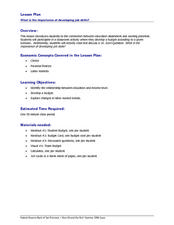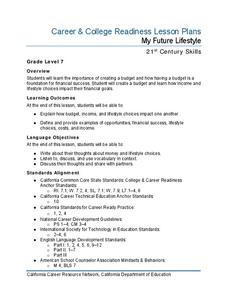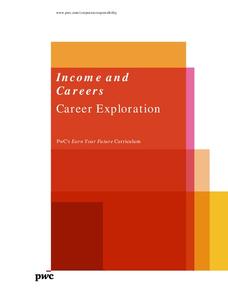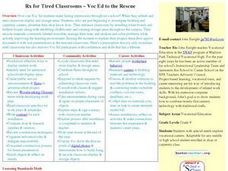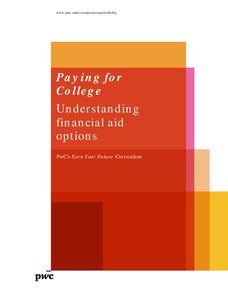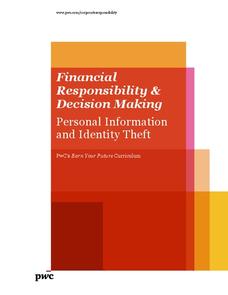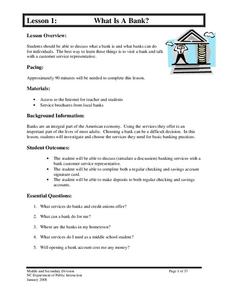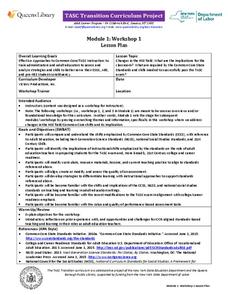Curated OER
What is the Importance of Developing Job Skills?
Financial literacy is the way to teach! The class works in small groups to discover the relationship between education and income level. They use their math and problem-solving skills to complete two different activities. They work out a...
Federal Reserve Bank
Arts and Economics Infographic Questionnaire
How do careers in the arts contribute to America's gross domestic product? Use an informative infographic that details the economic details of careers in the core arts, including design services, performing arts, and arts education, to...
California Department of Education
My Future Lifestyle
Mortgage, insurance, car payments...how much money will your learners need to support their desired lifestyle? Part three in a six-part college and career readiness lesson plan series tasks young job seekers with creating a monthly...
PwC Financial Literacy
Income and Careers: Career Exploration
Elementary schoolers take part in a virtual career day and are exposed to various career opportunities in the finance, education, and medical fields. By accessing a video you can download from the PwC Financial website, learners "shadow"...
Visa
The Cost of College: Financing Your Education
With college tuition at an all-time high, high school students must consider the financial obligations of attending higher education, as well as the impact of college on future career opportunities. Pupils will complete worksheets,...
Visa
A Perfect Fit: Finding the Right Career for You
Class members explore possible career paths and consider their own passions and interests by researching job openings, career descriptions, and skills, as well as reading the success stories of experienced entrepreneurs.
US Department of Commerce
Where to Next?
Salary, education, census statistics ... how do people choose their careers? Scholars complete worksheets and rely on census data to determine their career aspirations. Then, pupils conduct Internet research about places they would...
Federal Reserve Bank
Invest in Yourself
What are the different ways that people can invest in their human capital for a better future? Pupils participate in an engaging hands-on activity and analyze data regarding unemployment, the ability to obtain an education, and median...
Curated OER
Rx for Tired Classrooms: Vocational Ed to the Rescue
Secondary carpenters apply their skills to improve display spaces in classrooms at their campus. Includes a contract between workers and teachers who sign on for improvements in the their rooms. Concurrent exploration of building and...
Nebraska Department of Education
Managing My Money
Rent, food, utilities, gas, clothing, taxes! It all adds up. As part of a career planning and management unit, high school sophomores learn about financial planning and budgeting.
Federal Reserve Bank
Lesson 4: Back to School
Based on your current level of human capital, how long would it take you to earn $1,000,000? What about your potential human capital? Learners explore the importance of education and experience when entering the workforce, and compare...
PricewaterhouseCoopers
Paying for College: Understanding Financial Aid Options
With many options to pay for college, middle schoolers learn about each possibility and that continuing their education is worth the investment. They discover the difference between a grant and a loan and that some expensive colleges may...
Federal Reserve Bank
Financial Literacy Infographic Scavenger Hunt
A lesson in personal finance can be the most valuable part of a high school education. Connect the basics of banking with informational reading skills in a lesson that prompts teenagers to answer a series of questions based on an array...
California Department of Education
College: Plan Well and Pay Less
They say you gotta pay to play, and postsecondary education is no exception! High schoolers learn how to research and analyze the cost of postsecondary education as well as the different ways to pay for schooling. Learners then work...
Insurance Zebra
Insurance Curriculum for Middle and High School Teachers
Liability, deductible, premium ... what do these words mean, and how do they relate to insurance? Scholars complete a pre-test, matching vocabulary activity, and insurance timeline worksheet and become familiar with these terms. Next,...
PwC Financial Literacy
Planning and Money Management: Spending and Saving
Financial literacy is such an important, and often-overlooked, skill to teach our young people. Here is a terrific lesson which has pupils explore how to come up with a personal budget. They consider income, saving, taxes, and their...
PricewaterhouseCoopers
Paying for College: Finding the Right Fit
Most want to attend college, but do they know where? How will they afford it? How do they apply? Learners discover the costs associated with college and the best way to budget and possibly apply for financial aid.
PwC Financial Literacy
Finanacial Responsibility and Decision Making: Personal Information and Identity Theft
Elementary schoolers look into the very real, and scary, practice of identity theft. They discover the main techniques used by people who steal other people's identity. Learners produce an identity theft tip sheet and share their tips...
North Carolina Department of Public Instruction
What Is A Bank?
You're never too young to learn about banking and personal finance. Use a set of seven banking lessons to teach middle schoolers about checking and savings accounts, interest rates, loans and credit cards, and safety deposit boxes.
New York State Education Department
TASC Transition Curriculum: Workshop 1
Work out your core, Common Core State Standards, through the first workshop in a series of 15 designed for educators. Inquiry-based activities designed for all content areas and grade levels explore the shifts to new standards,...
Curated OER
1930 Census and the Consitution
Students read the Constitution and discuss the importance of enumeration. In this Census lesson, students complete a Census schedule and discuss the job skills of applicants. Students research Census data to compare and contrast the...
Curated OER
Advanced Math Budget Project
What financial situations and decisions await young learners after they graduate from high school? This project allows class members to glimpse into the types of responsibilities they will have as adults, from considering job...
New York State Education Department
TASC Transition Curriculum: Workshop 10
How have educational standards evolved? Educators of adults examine expectations in the 10th workshop out of 15 to better determine how standards have grown. Participants respond to a variety of sample questions to determine how they...
Mathematics Assessment Project
Arithmetic with Polynomials and Rational Expressions
It all starts with arithmetic. An educational resource provides four items to use in summative assessments. The items reflect the basic skill level required by the standards in the domain and are designed to have pupils reason abstractly...


